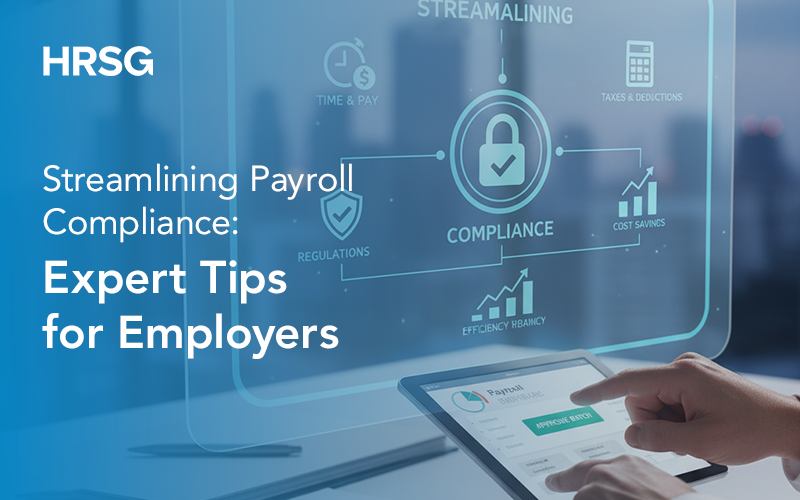Payroll management is a complex and time-consuming yet critical process for any business. You have to ensure every pay period is accurate while also keeping the changing tax laws, state-specific rules, and labor regulations in mind, which can be quite difficult.
Not taking the right steps to ensure payroll compliance exposes your business to fines, legal troubles, and employee dissatisfaction, which is something you should never risk.
This blog covers some useful insights to help you streamline payroll compliance in your business. These expert tips will help you navigate this critical function of your business with greater accuracy, fewer errors, and enhanced efficiency. So, keep on reading to learn more.
- What is Payroll Compliance and Why Is It So Important?
- Expert Tips for Streamlining Payroll Compliance as An Employer
- Partner With Experts
- Stay Up-to-Date on Legal or Payroll Regulation Changes
- Utilize Reliable Payroll Management Software
- Conduct Regular Internal Audits
- Train Your Payroll Staff
- Pay Attention to Accurate Record Keeping
- Create a Comprehensive Payroll Policy
What is Payroll Compliance and Why Is It So Important?
Payroll compliance refers to the processes businesses follow to ensure full adherence to laws, regulations, and guidelines governing employee compensation.
Payroll compliance is not just about issuing paychecks after calculating the wages of the employees. There is a wide range of things that are involved in payroll compliance, such as ensuring accurate tax deductions and benefit contributions to make sure you do not violate minimum wage laws or overtime regulations.
As an employer, you do not just have to distribute salaries but also have the responsibilities related to withholding correct tax amounts, National Insurance Contributions, and other statutory deductions from the salaries of the employees and then remitting these amounts to the relevant authorities on time.
This can be done only when you maintain proper records, create and provide accurate reports to government bodies, and keep up with the changes in tax laws, all of which fall under the umbrella of payroll compliance.
The following are a few points that show why payroll compliance is important for employers.
- Noncompliance in payroll management or not accurately withholding and remitting taxes can lead to heavy fines, lawsuits, or even criminal charges.
- Not paying attention to payroll compliance leads to reputational damage for your business, which can make it hard for you to attract new customers and top talent.
- Demonstrating payroll compliance boosts employee morale and reduces dissatisfaction.
- Proper payroll compliance helps businesses maintain financial predictability by eliminating the risks of unexpected fines that can affect your company’s financial health.
- Robust payroll compliance can facilitate the expansion of your business by streamlining your transition to newer markets.
Expert Tips for Streamlining Payroll Compliance as An Employer
The following are some effective expert-backed tips that you can use as an employer to streamline your payroll compliance.
-
Partner With Experts
The best and probably the most effective way to streamline payroll compliance is by partnering with experts. Professionals who provide payroll services can ensure that businesses that lack in-house expertise or the ones who operate in multiple jurisdictions ensure industry-specific compliance.
By hiring dedicated teams for payroll management, you can reduce errors in your payroll calculations and streamline the process in general.
-
Stay Up-to-Date on Legal or Payroll Regulation Changes
Payroll regulations or legislation are subject to change, and knowing about these changes and making the right adjustments accordingly is crucial to showing compliance.
Changes in employee laws, tax rates, statutory payments, and thresholds significantly affect the payroll processes.
To stay updated, you can subscribe to updates from regulatory bodies, visit government websites, consult with an expert payroll management company, or attend industry seminars.
-
Utilize Reliable Payroll Management Software
Automation is key to ensuring better payroll management and showing full compliance, and this is not possible without a reliable payroll management tool.
This software can automate complex but repetitive tasks like attendance tracking, payroll calculations, direct deposit processing, deductions, compliance reporting, and more, which reduces errors.
These tools automatically update tax rates based on new legislation, which ensures your payroll processes never violate any local or state laws. It is always a good idea to go for a software that gives you cloud-based solutions and is compatible with your existing accounting and bookkeeping systems.
-
Conduct Regular Internal Audits
Internal audit and compliance go hand in hand. Regular auditing of your payroll processes is a great way to prevent non-compliance. You need to conduct regular audits where you look at calculation accuracy, reporting timelines, employee classification, work hours, wages paid, deductions made, and tax filings to ensure you are not violating any laws.
If your organisation lacks resources or expertise to conduct internal audits, you can consider hiring an external auditor for an objective assessment.
-
Train Your Payroll Staff
Proper staff training is another way you can eliminate errors from your payroll management processes and ensure compliance. As an employer, it is your duty to ensure your payroll management staff knows the changes in legislation and is trained to use new and updated online payroll management software.
You can encourage them to complete refresher courses on key payroll tasks or to obtain CPP (Certified Payroll Professional) and FPC (Fundamental Payroll Certification) certifications to make sure they adhere to the latest payroll regulations and follow all the best practices.
-
Pay Attention to Accurate Record Keeping
Without properly maintained employee records, it is quite hard to manage payroll well and ensure compliance. Make sure there is a centralized system in place for collecting information regarding contact details, personal data, salaries, and benefits of the employees.
You need to regularly review and update this information as soon as there are any changes in terms of the role or pay rate of the employee. Keeping a detailed record of wages, work hours, and deductions makes it easier for you to adhere to labor laws and tax regulations.
-
Create a Comprehensive Payroll Policy
You need to come up with clear and transparent payroll processes, policies, and procedures to maintain consistency and ensure compliance. This policy should include payment timings, payment methods, overtime calculation methods, leave and holiday pay guidelines, and ways to resolve errors and discrepancies.
Having a robust payroll policy in place prevents misunderstandings and significantly streamlines payroll processes to a great degree.
Conclusion
Ensuring payroll compliance is not an easy task, especially when you lack the expertise and knowledge to navigate the changing regulations or complex online software.
However, by investing time and resources in better record keeping, employee training, regular audit, and keeping yourself updated about the changes in the payroll compliance rules, you can easily navigate the complexities of payroll management and compliance.
If you still find it hard to ensure payroll compliance, it is recommended that you seek assistance from a reputable company that specializes in HR, payroll, accounting, and bookkeeping services to save yourself both time and trouble.
Visit HRSG today to get the best accounting, bookkeeping, and payroll management services for businesses of all sizes to ensure accurate financial record keeping and compliance at all times.



